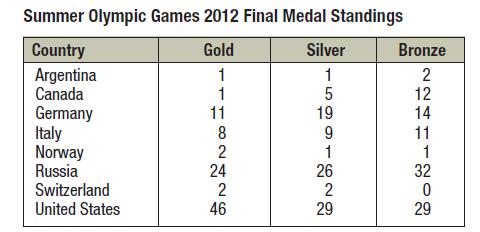Shown in the table are the type and number of medals each country won in the 2012
Question:
Shown in the table are the type and number of medals each country won in the 2012 Summer Olympic Games. You are to rank the countries from highest to lowest. Gold medals are highest, followed by silver, followed by bronze. There are many different ways to rank objects and events. Here are several suggestions.
a. Rank the countries according to the total medals won.
b. List some advantages and disadvantages of this method.
c. Rank each country separately for the number of gold medals won, then for the number of silver medals won, and finally for the number of bronze medals won. Next rank the countries according to the sum of the ranks for the categories.
d. Are the rankings of the countries the same as those in step a? Explain any differences.
e. List some advantages and disadvantages of this method of ranking.
f. A third way to rank the countries is to assign a weight to each medal. In this case, assign 3 points for each gold medal, 2 points for each silver medal, and 1 point for each bronze medal the country won. Multiply the number of medals by the weights for each medal, and find the sum. For example, since Argentina won 1 gold medal, 1 silver medal, and 2 bronze medals, its rank sum is (1 × 3) + (1× 2) + (2 × 1) = 7. Rank the countries according to this method.
g. Compare the ranks using this method with those using the other two methods. Are the rankings the same or different? Explain.
h. List some advantages and disadvantages of this method.
i. Select two of the rankings, and run the Spearman rank correlation test to see if they differ significantly.

Step by Step Answer:

Elementary Statistics A Step By Step Approach
ISBN: 9780077665807
9th Edition
Authors: Allan G. Bluman





